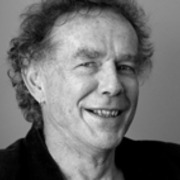
Martin Edmond
For Martin Edmond, to write scripts, “you have to think visually and you have to think dramatically . . . when you write film you’ve only really got two arrows in your quiver. You’ve got dialogue, which is words, and you’ve got objective description, which is what the camera sees.”
Growing up in Ohakune, Edmond was the only boy in a family of six children. His father was a teacher turned headmaster who managed to negotiate a pay rise for teachers after he became President of the Post Primary Teachers' Association. His mother was writer Lauris Edmond., After getting a degree in english (with Honours) and anthropology, with a Masters in the former, Edmond briefly flirtation with academia in Wellington.
In the mid 1970s Edmond made his first attempt at scriptwriting: adapting Maurice Duggan’s classic story Along Rideout Road that Summer with director Richard Turner (Squeeze), who he had acted for in some early short films. The film was never made.
Edmond spent a number of years as an actor and then lighting man for experimental theatre group Red Mole, in New Zealand and the United States. The group’s artistic interests were various, including film. Edmond was among those who appeared in a surrealistic silent film, which first screened as part of early Red Mole live show Slaughter on Cockroach Avenue.
Later Edmond appeared in whimsical road movie Red Mole on the Road. Edmond has described its making as a battle of wills between Red Mole legend Alan Brunton and the film's director, Sam Neill.
The silent film was made by rising cinematographer Leon Narbey, who had ambitions to work on something bigger. A few years later Narbey asked Edmond if he had any ideas that might make a film. Edward mentioned having read about a real-life Chinese poet known as Illustrious Envoy, who had been put in a mental hospital.
By 1981 Edmond had begun a new life in Sydney, an award-winning book of poetry behind him, plus frustrated hopes of studying scriptwriting. The Chinese idea lay dormant for a few years until Narbey mentioned it again. The duo began researching the mysterious Chinese man, and the Presbyterian missionary who had written about him. Thus the Illustrious Energy project gradually morphed from a short docudrama into a feature-length movie about the dying days of Chinese gold prospectors in Central Otago. It grew in spurts each time Edmond visited Auckland for a scriptwriting session.
"It was important not to invent things but base every detail, where possible, on documented fact," Edmond told Illusions in 2008. But documentary realism was not the aim. "We wanted the film to look and sound like a T’ang dynasty poem."
Though Illustrious Energy won eight awards at the Listener Film and Television Awards, and prizes overseas, fortune was not on its side. Sold on to an overseas company after the collapse of Mirage Entertainment, the original negative was long misplaced, until restoration decades later, and screenings at the 2011 Wellington and Dunedin Film Festivals.
Edmond and Narbey collaborated again on their second feature, as writer and writer/director respectively. The Footstep Man (1992) revolves around a sound effects man (Steven Grives) who starts to loose touch with reality while working on post-production of a feature film. A character in the movie he is making (played by Jennifer Ward-Lealand) becomes an object of obsession both to the soundman and — inside the film within the film — to French painter Henri de Toulouse-Lautrec.
Originally the movie was conceived with four main characters. To Edmond’s regret, budgetary issues saw the removal of the producer character. None-the-less The Footstep Man was nominated for best film in both the NZ Film Awards, and at Portuguese fantasy festival Fantasporto. It was also selected for the San Sebastian Festival in Spain. The year it played at Fantasporto, Edmond won third prize at the Wattie Book Awards for his first book of non-fiction, The Autobiography of My Father.
Still based in Australia, Edmond’s writing output continued to include film scripts. Terra Nova (1988) revolves around a young New Zealander (Jeanette Cronin) who kidnaps her child and escapes to a boarding house in Australia. It marked the feature debut of another transplanted New Zealander, Paul Middleditch. Terra Nova was runner-up for Best Debut Feature at the Montreal World Film Festival.
By now Edmond’s name was popping up everywhere: aside from Terra Nova, the five years between 1997 and 2002 saw two short film scripts and the publication of five books, including the decade-in-the-writing Resurrection of Philip Clairmont (2000) and Chronicle of the Unsung, Edmond’s genre-straddling, Montana award-winning autobiography.
The two shorts were 2002‘s Earth Angel, and the Kiwi shot Philosophy, a tale of a close encounter with an eerie hearse driver, which took away an NZ Film Award as the Best Kiwi short of 1999.
Edmond went on to work on early drafts of 2011 feature 33 Postcards, which marked only the second co-production between China and Australia. Selected for development at the New York-based Tribeca Film Institute, the script involves a Chinese orphan who travels to Australia to meet her sponsor (Guy Pearce), only to discover he has done jailtime. 33 Postcards screened at more than 15 film festivals across the globe.
Profile updated on 10 October 2025
Sources include
Martin Edmond, 'Red Mole on Screen' NZ On Screen website. Loaded 26 June 2021. Accessed 10 October 2025
Martin Edmond, The Autobiography of My Father (1982: Auckland University Press)
Martin Edmond, Chronicle of the Unsung (2004: Auckland University Press)
Russell Campbell, 'Microcosm/Macrocosm - An Interview with Leon Narbey’ - Illusions 8, June 1988, page 2
Helen Martin and Sam Edwards, ‘Interview: Martin Edmond - co-writer’ in New Zealand Film 1912 - 1996 (Auckland: Oxford University Press, 1997)
Laurence Simmons, ‘ “That rare thing, a film that is also a work of art’’ - Laurence Simmons interviews Martin Edmond’ - Illusions 40, July 2008, Page 21
‘Episode 22 - Martin Edmond’ (Video Interview) Cultural Icons Website. Accessed 10 October 2025